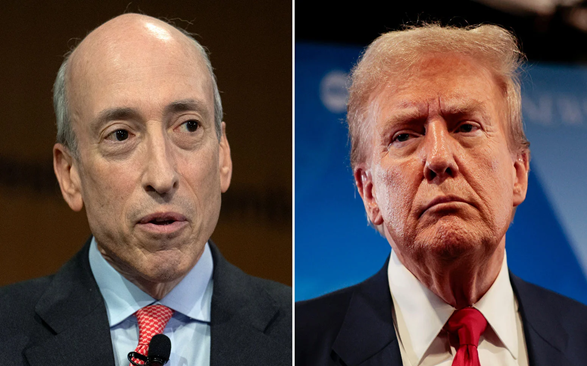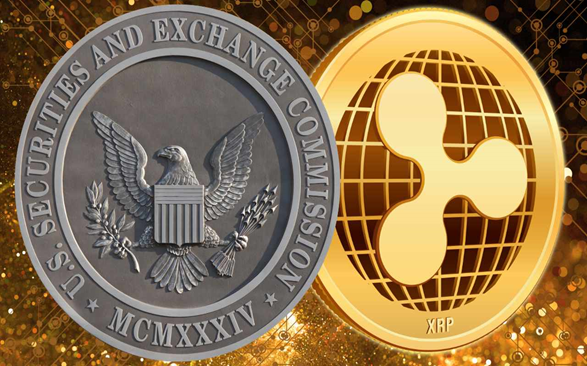by Jude Ayua
Gary Gensler, the US Securities and Exchange Commission (US SEC) Chair, has hinted he will step down before President-elect Donald Trump’s inauguration in January 2025. Gensler’s special appreciation to the SEC staff during his speech at the Practicing Law Institute (PLI)’s 56th Annual Institute on Securities Regulation in mid-November is what suggested it might be his resignation.
“Before I close, I want to say something about the SEC and its staff. It’s a remarkable agency. The staff and Commission are deeply mission-driven, focused on protecting investors, maintaining fair, orderly, and efficient markets, and facilitating capital formation,” Gensler said.
Although Gensler did not mention his resignation expressly during the speech at PLI, there are signs pointing to it. His reputation of “regulation-by-enforcement” at the US SEC during his tenure has been unfavorable to the cryptocurrency market, which caused Gensler’s disapproval among stakeholders. The US SEC brought several cases against crypto firms and defended a few cases against it.
Gensler’s Reputation and Legacy at the SEC
Throughout Gensler’s tenure, he has maintained strong regulatory oversight over the cryptocurrency market, highlighting investor protection, compliance, and market integrity as his key objectives. Gensler’s approach has resulted in numerous high-profile enforcement actions against crypto exchanges, in his firm position to designate many digital assets as securities.
Below is a summary of key recent and ongoing cases between the US SEC and various entities in the crypto industry:
- Ripple Case: The US SEC sued Ripple Labs in December 2020 for selling unregistered securities. In July 2023, a court ruled that XRP is a security when sold to institutional investors but not when sold to the general public. The US SEC dismissed claims against Ripple’s executives in October 2023. In August 2024, a court decision ordered Ripple Labs to pay $125 million in favor of the US SEC. A fraction of the $2 billion the SEC sought against Ripple, the agency appealed against the ruling, which is pending before the U.S. Court of Appeals for the Second Circuit.
- Coinbase Litigation: In July 2024, Coinbase sued the US SEC for failing to provide regulatory clarity and for not granting its requests to disclose past crypto investigations. Meanwhile, the US SEC sued Coinbase in June 2023 for operating as an unregistered broker, exchange, and clearing agency.
- Terraform Labs Case: The US SEC sued Terraform Labs and its founder in February 2023 for securities fraud. In April 2024, a court ruled in favor of the US SEC, stating that Terraform’s assets were securities. In September 2024, a court approved Terraform to wind down its operations in bankruptcy after agreeing to settle with the US SEC.
- Binance Case: The US SEC sued Binance in June 2023, accusing it and its co-founder Changpeng ‘CZ’ Zhao of engaging in “an extensive web of deception, conflicts of interest, lack of disclosure and calculated evasion of the law.” While Binance settled with the Department of Justice for over $4 billion, it has continued to litigate with the US SEC.
- Green United Case: In March 2023, the US SEC charged Green United, LLC, alongside its founder and one of its promoters with alleged defrauding of investors and its offering of unregistered crypto assets as securities. In September 2024, a court ruled that Green United’s crypto mining device, Green Box, is a security.
- Kraken Case: The US SEC filed charges against Kraken in November 2023 for operating as an unregistered securities exchange. Kraken filed a motion to dismiss the complaint, which the court rejected on 18 November 2024. Kraken claimed that the US SEC targeted it because of its 10 May 2023 testimony about “the SEC’s overreach in crypto before both the House Financial Services Committee and the House Agriculture Committee.” It testified that current US SEC laws do not adequately cover the digital asset industry, and advised Congress to “do more to put in place a set of rules to better protect consumers and investors.”
- Trade Associations’ Lawsuits: In April 2024, the Blockchain Association and the Crypto Freedom Alliance of Texas filed a lawsuit against the US SEC for introducing a new rule that expanded its interpretation of what it deems a “dealer” of securities to include digital assets entities. They argued that the agency exceeded its authority by contradicting the 90-year-old law regulating securities dealers.
- Crypto.com Lawsuit: In October 2024, Crypto.com filed a lawsuit against the US SEC after it received a Wells notice from the agency. The company claimed that the Gary-led US SEC’s expansion of its jurisdiction to include digital assets is unlawful.
- State AGs Suit: On 18 November 2024, eighteen Republican attorneys general sued the US SEC and Gensler claiming that the agency overstepped its authority by its enforcement actions against crypto entities. The states involved are Kentucky, Nebraska, Tennessee, West Virginia, Iowa, Texas, Mississippi, Montana, Arkansas, Ohio, Kansas, Missouri, Indiana, Utah, Louisiana, South Carolina, Oklahoma, and Florida. Led by Kentucky Attorney General Russell Coleman, the states contend that the US SEC has attempted to “unilaterally wrest regulatory authority away from the States” on crypto enforcement.
- eToro Settlement: In September 2014, the US SEC announced its settlement with eToro USA LLC for allegedly operating an unregistered broker and clearing agency “since at least 2020” and thereby violating Federal securities laws.
- Immutable Wells Notice: In November 2024, Immutable received a Wells notice from the US SEC. “While not specified in the notice, we believe its claims are targeting the listing and private sales of IMX in 2021,” Immutable said in its statement.
Read also: US SEC classifies crypto mining device as security.
Read also: Uniswap Labs receives Wells Notice from the US SEC.
Notwithstanding these cases, Gensler’s tenure has been lauded for the US SEC’s approval of Bitcoin ETFs. On 10 January 2024, the US SEC, though apparently compelled to do so by an order of court, approved the first US-listed exchange-traded product to track spot bitcoin. This is despite Gensler’s warnings about bitcoin’s speculative nature.
Notable remarks against Gensler’s regulatory approach
Gensler has faced significant criticism for his aggressive stance on cryptocurrency enforcement. Some notable remarks include Gary’s excessive focus on the crypto industry: Critics argue that the US SEC has devoted disproportionate resources to target the industry, which represents a small fraction of global finance.
Another criticism against him has been described as “destructive leadership.” U.S. Representative Tom Emmer has labeled Gensler as the most “destructive” and “lawless” US SEC chair in history, accusing him of creating unnecessary terms like “crypto asset security.”
Gary has also faced backlash from the crypto industry as many feel that Gensler’s enforcement approach has stifled innovation and driven businesses to more favorable jurisdictions.
The state attorneys general who recently sued the US SEC also voiced their displeasure with Gensler’s overstepping the US SEC’s jurisdiction in crypto enforcement. The attorneys general noted it in their complaint:
“Instead of respecting that constitutional balance of power, and allowing States to develop and enforce their own tailored digital asset regulations based on their own policy priorities … the SEC’s assertion of sweeping jurisdiction without congressional authorization deprives States of their proper sovereign role and chills the development of innovative regulatory frameworks for the digital asset industry,” the complaint reads.
Read also: Binance accuses the U.S SEC of aiming to unilaterally define crypto market structure.
Gensler Defends His Administration
Despite the crypto industry’s disapproval of Gensler, he is still confident about his legacy at the US SEC. “I’ve been proud to serve with my colleagues at the SEC … to protect American families on the highways of finance,” Gensler said during his speech at the PLI’s Annual Institute on Securities Regulation.
Gensler explained in his speech that his administration has adopted and applied “Common-sense rules” in protecting investors. “Over the years, I’ve slept better knowing that when one of my three daughters borrows the car keys, that there are common-sense rules of the road to protect them,” he noted.
Applying the “Common-sense rules” to the capital market, Gensler stressed, “We’ve worked to lower costs and risks in the capital markets … we’ve put in place a number of reforms, such as those to promote central clearing in these markets.”
Gensler justified the US SEC’s regulation-by-enforcement approach with respect to the crypto market: “Everything we’ve done is focused on ensuring compliance with our laws. What we’ve found since the 1930s is that compliance matters. It protects investors. It builds trust in our capital markets. It helps issuers tap into our markets.”
“Court after court has agreed with our actions to protect investors and rejected all arguments that the SEC cannot enforce the law when securities are being offered—whatever their form,” he added.
Gensler also referenced his predecessor, Jay Clayton’s actions which aligned with the work of the current administration:
“When I arrived in 2021, the Commission under Chairman Jay Clayton had already brought some 80 actions, including the Ripple case, against participants in the crypto markets that were not following the common-sense rules of the road,” Gensler noted.
Gensler also clarified that contrary to popular opinion, his administration has not treated every digital asset or token as securities:
“Not every asset is a security… Bitcoin is not a security, and the Commission has never treated bitcoin as a security. Our focus, rather, has been on some of the 10,000 or so other digital assets, many of which courts have ruled were offered or sold as securities.”
Read also: U.S SEC’s XRP lawsuit against Ripple finally over.
Trump’s Likely Choice
Like many stakeholders, Trump has expressed his sentiments against Gensler. At the Bitcoin 2024 conference in Nashville Tennessee, Trump said, “On day one, I will fire Gary Gensler and appoint a new SEC chairman.” Trump’s statement is allegedly one of the reasons Gensler is expected to step down voluntarily.
Appointed SEC chair in 2021, Gensler’s term technically runs until 2026, However, when a new administration takes charge, it is expected that agency heads will resign.
While the choice of the US SEC Chair under Trump’s second term is still undecided, several candidates are being considered. Former SEC Commissioner Dan Gallagher, currently with Robinhood, has shown reluctance but could still be a choice. Bob Stebbins, former US SEC General Counsel, whom Jay Clayton is reportedly backing, is seen as likely to align with the administration’s agenda if chosen. Teresa Goody Guillén, a blockchain advocate, is also rumored to be a leading candidate.
Other names include Brad Bondi of Paul Hastings and Paul Atkins of Willkie Farr, both known for their lenient stances on crypto regulation. Meanwhile, former Commodity Futures Trading Commission Chairman Christopher Giancarlo has dismissed speculation about his candidacy.
Read also: Coinbase: Impact of the U.S. SEC’s Legal Action; XRP Case
Discover more from Crypto Asset Buyer
Subscribe to get the latest posts sent to your email.





